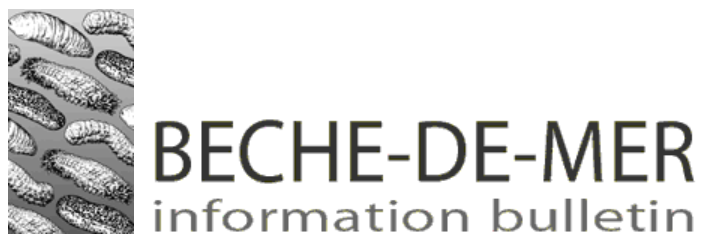
Group Coordinator and Bulletin Editor
Production
Pacific Community, Fisheries Aquaculture and Marine Ecosystems Division, Information Section, SPC, BP D5, 98848 Noumea Cedex, New Caledonia.
Produced with financial assistance from the Australian Government, the European Union, France and the New Zealand Aid Programme.
Editorial
The 35th issue of Beche-de-mer Information Bulletin has eight original articles, all very informative, as well as information about workshops and meetings that were held in 2014 and forthcoming 2015 conferences.
The first paper is by Marc Léopold, who presents a spatial management strategy developed in Vanuatu and New Caledonia. This study provides interesting results on the type of approach to be developed to allow regeneration of sea cucumber resources and better management of small associated fisheries.
Species richness, size and density of sea cucumbers are investigated by Roger G. Dolorosa in the Tubbataha Reefs Natural Park, Philippines. The data complement the nationwide monitoring of wild populations.
Ana Setyastuti and Pradina Purwati provide a list of all the species included in the Indonesian trepang, which have ever been, and still are, being fished for trade. The result puts in evidence 54 species, of which 33 have been taxonomically confirmed.
Frédéric Ducarme describes the result of a survey that was conducted on the coral reefs in the north of Baa atoll (Maldives) for two months in 2014. This study increases the number of holothurian species recorded in the Maldives to around 24.
Nurzafirah Mazlan and Ridzwan Hashim give the first report of induced spawning and larval rearing of Holothuria scabra in Malaysia. Survival rate of 4.2% was recorded from three successful spawnings.
Thierry Lavitra et al. analysed the effect of the size of juveniles released within and without nurseries inside marine pens in Madagascar. This experiment showed that the use of nurseries is not necessary in farming sites with a low density of predators and that juveniles less than 5 g can be released in these sites.
Haruko Koike et al. report the result of an independent baseline fishery survey conducted around the islands of Old Providence and Santa Catalina, Colombia in 2014. Total population size was considered too low to sustain a fishery.
Vianys Agudelo and Adriana Rodríguez report handling conditions, water quality and limitations associated with the spontaneous reproduction of Stichopus sp. from Caribbean Sea, Colombia. The larval culture they made is described.
Chantal Conand reports information on lesser known trepang markets, including Pyongyang (Democratic People’s Republic of Korea), Pusan (Republic of Korea) and San Francisco. Choo Poh Sze and Chantal Conand also give information on the sea cucumber products present at the last China Fisheries Exposition.
There were many workshops and meetings about sea cucumbers in 2014. A summary of the presentations / discussions is given in this issue, with details about conferences that will be held in 2015. Readers will also find web-site addresses with sea cucumber movies and general information and observations on holothuroid juveniles.
Bonne lecture !
Congratulations are due to François Michonneau, whose thesis ‘’Species limit and diversity in sea cucumber’’ won him his PhD at the University of Florida.
Contents
Léopold M., Ham J., Kaku R., Gereva S., Raubani J., Moenteapo Z. (pdf: 238 KB)
Dolorosa R.G. (pdf: 1 MB)
Mazlan N., Hashim R. (pdf: 310 KB)
Lavitra T., Tsiresy G., Rasolofonirina R., Eeckhaut I. (pdf: 532 KB)
Hoike H., Usseglio P., Ramos F. (pdf: 516 KB)
Agudelo V., Rodriguez A. (pdf: 896 KB)

